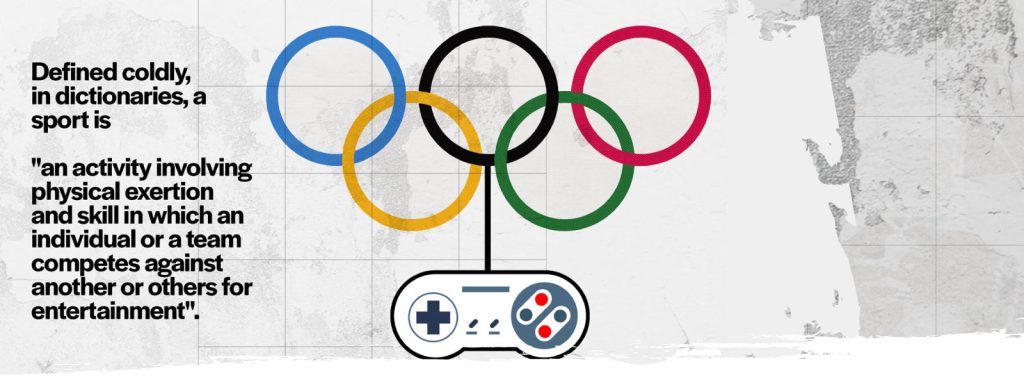Defining what’s a sport can be tinged with superiority and favouritism! Wait billiard? Is that even a sport? What about darts? Or e-sports? Or car races? Or hunting? They very often don’t look very athletic. So, why are so many people addicted to it, training day and night to excel?
A classic approach is how “well-established” the sport is, and inclusion in the Olympic Games often settles that. But huge sports like baseball, cricket and polo have been in and out from the Games, while rhythmic gymnastics has been a constant presence since the 1980s.
The IOC look at tradition and current trends, the amount of people practicing that sport and in how many countries, how profitable it is to broadcast it, athletes’ safety and many many other regulations*.
Defined coldly, in dictionaries, a sport is “an activity involving physical exertion and skill in which an individual or a team competes against another or others for entertainment”. That doesn’t cover the passion you probably feel for what you do, both as an athlete and as a spectator!
Honing in on physical exertion, it’s easy to assume that the more exertion, the better the athlete. When I was in my early 20s and at the top of my game as a professional, I used to think this way. I ended up considering myself so fit, so athletic, almost super-human, and above every other amateur who didn’t take sport seriously enough. My teammates and I created our own circle of “valuable” people, slagging off everybody else for not putting enough effort into sports.
A lot of extremely fit athletes – and pros like me and my basketball teammates – feel that superior. What I know for sure now is that I have never been so wrong in my life. Now, I don’t value the level of performance as much as the participation.
- How to cooperate with a team or peers unlocks a better version of ourselves.
- It educates us to acknowledge our weaknesses with a view to overcome them**.
- It makes us understand that losing is part of life, and there is no advancement without some disappointment. Two steps forward and one back is still a step forward.
- There is nothing like sport to push our limits in the unshakable desire to be better.
- We gain respect for opponents. Playing a fair, tough game is the best way humans have discovered to honour and pay respect to somebody else.
If these are not skills extremely useful for life, I don’t know what is!
My tip is to identify who is a sports person rather than what is a sport.
A sport is when healthy dedication, focus, and training are involved in order to be your best possible self and fight a fair, honourable battle against an equally honourable opponent; all of it framed in an unquestionable respect for the well-defined rules of the game.
If there is no opponent, and if playing under no set of rules, there is no sport. It is still healthy and valuable to take on physical activity, but it is no sport, and that is another story.
E-sports, car racing, darts can be classified as sports. And no, hunting is not a sport.
But “sportsmanship” is a fantastic term which can be applied to all we do: “Fairness, respect for one’s opponent, and graciousness in winning or losing”****. E-sports athletes demonstrate this as much as conventional athletes. I’m sure that when the day comes, they combine all the positives they’ve gained from e-sports with the physical exertion and daylight gains from for example regular ball games. And some good old-fashioned real human contact, which no screen will ever be able to substitute.
References
*Encyclopaedia Britannica (2021) ‘How sports are chose for the Olympics.’ Available online at: https://www.britannica.com/story/how-are-sports-chosen-for-the-olympics#:~:text=The%20Olympic%20Charter%20indicates%20that,countries%20and%20on%20three%20continents [28/02/2021]
**Halldorsson V., Thorlindsson T., Katovich M. A. (2017)‘Teamwork in sport: a sociological analysis.’ Sport in Society, 20(9),1281-1296.
***Morgan W. J. (2007) Ethics in sports. 2nd edition. Philadelphia: Human Kinetics.
****Merriam-Webster (2021) Sportsmanship. Available online at https://www.merriam-//webster.com/dictionary/sportsmanship [27/02/2021].
Further reading
Olympic Games (2021) ‘List of summer and winter Olympic sports’. Available online at https://www.olympic.org/sports [28/02/2021]
Nazarenko L. D. (2014) ‘The role of intelligence in sport’. Ulyanovsk state pedagogical university.






